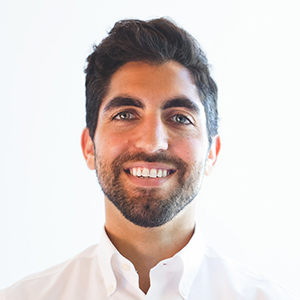Pasha Maher knows the value of education.
A 2013 graduate of the University of South Carolina, Maher has spent more than half a decade developing the Stiegler EdTech program, which provides training and a clear pathway for people from underrepresented communities to enter technology careers. So far, 200 graduates have gone on to well-paying jobs, and the program has expanded nationally.
Growing up as a child of Iranian immigrants, Maher learned from his parents that education is a great equalizer.
“My mom and dad were refugees of the 1979 Iranian Revolution. They came to America bereft, destitute, unemployed and without skills. They didn’t know how they were going to live – they didn’t even know each other,” Maher says. “They ended up living the ‘American Dream.’”
When they met, Maher’s dad was a housekeeper at a hotel in Houston, Texas, and his mom was a server at a restaurant. His dad rose through the ranks to become a hotel manager, and his mom got her master’s degree and became a pharmacist.
Along the way they started a family, and Maher never took for granted the hard work it took for his parents to make a life in the U.S.
“The idea of the American Dream to me as a child of immigrants was that I must fall in line,” he says. “I must do the things that are expected of me because I don't have the personal network and the social capital to do things that your traditional American might be allowed to pursue.”
Maher’s friends in his hometown of Richmond, Virginia, had their eyes on Ivy League colleges. But when he heard about scholarships for the Capstone program at USC, he set his sights on South Carolina.
Maher also realized that USC had opportunities he wouldn’t find at a private university.
“If you’re a great student and you go to USC, you’ll have a faculty that cares about you because you’re an engaged student – and it will be affordable,” he says. When he started at USC, Maher wanted to do whatever would teach him most, so he started out as a premedical student, then considered a business degree. But in the mathematics and statistics departments in the College of Arts and Sciences, he found a wealth of mentorship and faculty support.
“I still remember walking into the Career Center for the first time and asking to meet with someone about math or stats. It turned out the chair of the math department was right there, and he ended up talking with me for over an hour,” he says.
Maher double majored in mathematics and statistics, winning the statistics department award as a junior and senior. Thanks to internships with the Capstone program, he graduated with a job at Bank of America in Charlotte, North Carolina.
After a few years in the financial sector, Maher decided to change course and took a role with Carolina Fintech Hub, an organization based in Charlotte, NC. Maher’s came on as a founding member, leading on the Workforce Investment Network initiative.
When Maher joined the team in 2017, Charlotte was ranked last for upward mobility in a national study of major cities, a status they hoped to change.
“Usually, in the state of North Carolina, there are about 20,000 open jobs in technology every year but only about 2,500 computer science graduates cumulatively,” Maher says.
“We said, ‘If there are all of these open jobs in technology and all of these people in our city who want work and can’t find it, how do we bridge that gap?’”
Their approach was to bring these skills to people who may never have considered working in tech because the door had never been open to them before. Carolina Fintech Hub started
a program for adults to take on apprenticeships,
Gamecock Nation: Charlotte
Altogether, there are more than 25,000 USC graduates living in the Charlotte area,
making it the No. 3 destination for Gamecock alumni after Columbia and Greenville,
South Carolina.
Read more about alumni who live and work in Charlotte, NC.
Of the 200 graduates of the program so far, 80% have been people of color and more than half have been women. While most recruits started out unemployed or underemployed, all of the graduates have gone on to well-paying jobs in the field.
The organization also began an initiative for high school students to learn coding and related skills, with the goal of inspiring teens to study STEM in college or pursue tech careers.
As the program expands to other states, they’ve rebranded to Stiegler EdTech, which honors the late Rick Stiegler, former Chief Technology Officer of LendingTree, who had advocated for education and hoped to one day build a school that would create pathways for future workers, no matter their background.
Maher says contributing something to education has been one of the main goals for his own life, which is why he’s happy with the path his career has taken.
“I’ve always been purpose driven. I’m working more and way harder than I was back then, and it’s a completely different form of work, but it feels more life-affirming for me,” he says.





